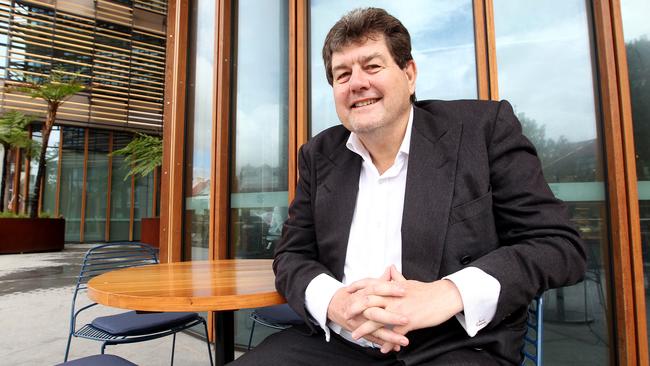Psychologist Paul Lyons: Time to toughen up, kids
Psychologist Paul Lyons hopes he can make kids stronger by building resilience.

Mental toughness and improving resilience among students in their final years of high school or university has not always been a focus for institutions, but a psychologist working with British partners is hoping he can make kids stronger by building resilience.
Paul Lyons is the chief executive of Mental Toughness Partners and works with individuals, organisations, schools and tertiary institutions to run one-off or group sessions about culture.
“Mental toughness defines your ability to perform under stress or pressure no matter what the circumstances, and that relates well to students with exam pressures and going through their HSC,” Lyons says. “The wider definition of mental toughness is the ability to build resilience and confidence and spot opportunities, and when you put those together, you have someone who’s mentally tough.”
Lyons had been working in the corporate sector and came across mental toughness work being undertaken by psychometric testing company AQR, which specifically measured the trait.
AQR was later involved in a study, published last year, that measures control, commitment, challenge and confidence in 9000 students from 58 schools in England and Scotland, in a bid to determine their mental toughness.
The study found children at independent schools were mentally tougher than those at government schools, which led Lyons to consider the difference between private and public school students in Australia. No such research has yet been undertaken, but it has helped Lyons shape his work with schools and tertiary organisations.
Lyons, who worked in recruitment for 30 years before starting his own company, Ambition, says AQR sparked his interest in trying to define particular traits in people, such as resilience, grit and growth mindset, which he had come across during his corporate life.
He has noticed over the past decade the changes in the younger generations, and how they are also less resilient than baby boomers and the older generation X workers.
In the past, people left home earlier, married younger, bought houses and committed themselves financially, sought jobs for life and had children earlier. In short, Lyons says they were tougher earlier.
“Millennials are likely to be less resilient, but mental toughness develops with age and we become mentally tough and more resolute with tackling life changes.
“The younger generations are more used to living with comfort and that tends to dilute resilience and mental toughness. It’s not only that they’re younger and have to learn about these things but they’re coming from a lower base because quite a lot is done for them, they have a nice quality of life and don’t have to strive and earn things as much.
“We have a different mindset to mental toughness and resilience and grit. They’re of a different mindset, and we don’t have an expectation of being given everything.”
At the workplace level, Lyons says industry needs to help young workers grow up. But he says there has also been a marked change in the school system in recent years, with a greater focus on soft skills, growth mindsets and dealing with adversity.
The growth mindset and soft skills focus has come from industry and employers demanding younger workers have an understanding of change and, in some respects, a reliance on the next generation to be able to move with technological advancements and help future-proof their businesses.
Jobs are evolving rapidly, technological changes mean roles are being superseded and the workforce is moving towards intelligent careers.
With his own children aged 10, 16 and 19, Lyons says schools are focusing on making children more resilient than a decade ago to prepare for those changes.
“If I compare my 10-year-old and my 19-year-old, there’s 10 years’ difference but there’s a broader focus on learning different skills now,” he says.
“With my 10-year-old, two years ago we started having conversations about fixed and growth mindsets, and to have these conversations with an eight-year-old in mindset is important. When I was eight it was all about dreams.”
He says soft skills such as being able to communicate, have confidence, overcome challenges, seek opportunities and adapt to change are more important than having a good academic record, and likely to result in well-rounded students.
The mental toughness measurements and resilience training has been under way in the education system in Britain for the past decade, and Lyons says it will also permeate the Australian sector, creating positive results for schools and students.
Robert Chasse, education manager in the Centre for English Teaching at the University of Sydney, recently worked with Mental Toughness Partners as part of a workshop with his team. He is considering using the psychometric data and training with international students taking university pathway courses.
“It’s pretty relevant — the more meta cognitive awareness we have about ourselves, it empowers us more to address the four Cs of control, commitment, challenge and confidence,” Chasse says. “Mental toughness is essentially developing life skills for any context — it’s valuable.”
He says the course aligns with his own engagement studies, particularly with international students who may fear going out, socialising or doing extra-curricular activities could hamper their studies and influence whether they are accepted into university.
He has developed a gamification tool to encourage students to engage — or become more resilient — with a points system when students swipe their cards at university locations or undertake specific activities, with a daily points target and levels to unlock.
“What we wanted to do was increase engagement outside of the classroom,” he says. “For one cohort, over 50 per cent unlocked a minimum level and they were all recommended for university. They were all independent and they were all proactively mapping out their student experiences — it was along the line of mental toughness.”


